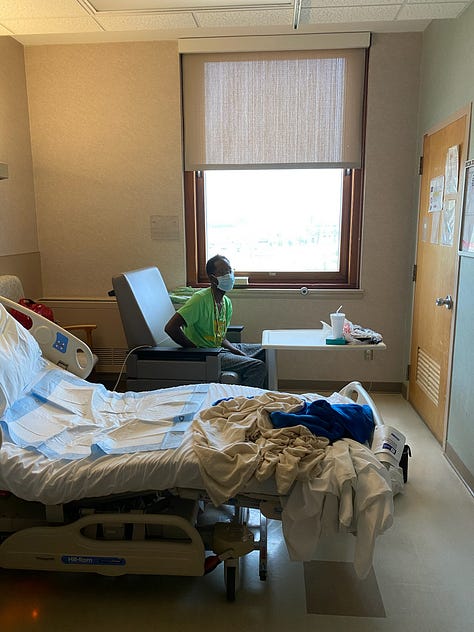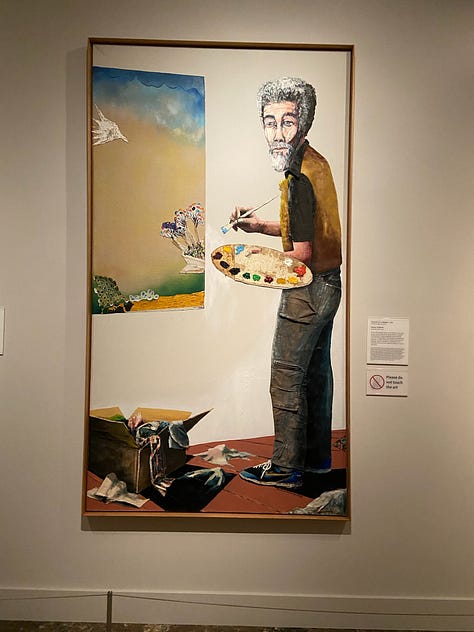1.
I first read Babylon during my morning Substack scroll before practicing tai chi as part of my preparation to go to my 10:30 dialysis appointment. When I was a teenager on peritoneal dialysis, my father introduced me to meditation and to the world of holistic health. Unlike modern medicine, which focuses on curing illness, or fixing people with sickness, holistic medicine facilitates healing by holding space for wholeness. For years I practiced meditation to be still, to explore below the surface of things. My intentions were to reach the place where sickness does not exist.
Later, my spiritual practice would expand to include ancestral reverence. Experiencing both my brother’s and my mother’s passing in my adolescence moved me to look for practices that contradicted the urgent, nonstop, unforgiving work-life culture that I was born into in the United States. My father was taken out of elementary school to help his mother earn money in the Southern agricultural fields. He remembers going to school approximately one-fourth of the year as a child. Many of us experience this society– this economy masquerading as a culture- as unforgiving and unresponsive to our needs. I remember being in the hospital after surgery and having homework sent to my convalescence bed and thinking nothing of it. I learned to embody an ancestral discipline of perseverance under any circumstance.
These two modes of being, the meditative and the ancestral, became the technologies of liberation that birthed “Owólabi Aboyade” and continue to guide me. With these I eventually learned how to privately carve out time to hope, to mourn, to remember, to worship, to heal. Through these rituals I attempted to reach beyond the limitations that consensus reality has placed on me. Eventually the concept of “spiritual warfare” stuck to my mind.
Some have chided me, saying they find those two words together are contradictory. Not so for the Vodun of Haiti who organized in nature with ritual and ceremony to upend the slave masters, their plantations, corporations and the families that claimed to own them. Not so for “Owólabi Aboyade” who observes how trauma is inflicted upon populations to guide us towards feeling stuck or trapped and coping through consumerism. Also coping by externalizing our power to authorities and trusting these authorities more than we do ourselves. For me, sitting at my desk in the United States of America, spiritual warfare is a daily confrontation with that which is considered normal and ordinary.
Even if holding that “Spiritual warrior” framework is contradictory, let’s celebrate my ability to live amidst contradiction as a yearning for depth of experience, a hunger to create a new synthesis. We know that the contradictory is feared and despised by those who are subjects to rationality– that’s a condition, I do my best to escape.
For me, to be a spirit, of spirit, composed of love and at the same time for me to be sick and dependent on corporations providing me with mechanized dialysis and synthetic medicines was a contradiction. My grandfather sang gospel in the hospital at his wife’s deathbed. The prayers of my friends combined with my meditations to help me leave operating rooms in pain, half groggy, laughing and joking. If I can live with those contradiction, then dammit I can live as a “spiritual warrior.”
2.
Alejandra Villegas’s “Babylon” is a beautiful reflection on magic in these times. It begins looking towards “the modes humanity has used to reach up to the celestial realms or down to the depths of hades.” In this essay and all of her posts, she invites us to a magical, thoughtful intimacy, “I can and will go on about those eternal beings and share all my sidequests along the serpentine paths of research on religion and esotericism.” Above all, her Substack essay is a testament to Ale as a researcher, not a mere academic, but one who is guided by urgency and curiosity. We can all be researchers and don’t need institutional accreditation or permission. Her post inspired me to share a little bit about my own side quests and research initiatives.
I must confess I was personally challenged by this sentence of “Babylon”, “Right now, I want to talk to you not of angels and demons but something just as sacred. I want to talk about humanity.”
I must confess that my spiritual practice has not been defined by such principles of transparency, even though I do find them beautiful. I’d wager that it’s because Traditional African Religion has moved in secrecy on this hemisphere much longer than it has in the public eye, especially longer than it has been trendy. Christianity was forced on us; Africa was denigrated and made into the butt of jokes. I must confess, when I was a college student in the 90s and mainstream media flooded our minds with images of famine in Africa, I made my share of African jokes, which had by that time built up for over a decade. Gratefully I was lovingly corrected by classmates in college. Africa was not something my generation easily claimed. This was part of the holistic healing of the guy who would grow to become “Owolabi Aboyade.”
Our cultures based on initiation demand we learn to be attentive to the dichotomy between what should be shared with publics and what should be kept behind the veil of experience. Living behind enemy lines, our lineages became skillful in sending coded messages rather than outright declarations such as this one.
Experiences with appropriation also have led to mistrust of including white Americans in our communities and teachings. Sadly we’ve seen white Americans who have been initiated use their connections and privileges to promote their brands and advance their personal authority. We have no idea what authorizations they have from the godparents who taught them. We don’t know what conversations and transformations they embody. We only know that these patterns continue the same racial capitalism that brought us to this hemisphere in chains. Many of our conversations –even our debates– are about upholding racially “closed systems.” In other words, it's rare for Diasporic African Traditional Religions to claim to have a message for “humanity.” Much more common to be For Us, By Us.
Reading “Babylon” I had to take a pause to uncover what it means for me to consider “humanity.” There are so many pressures in Black American communication to only consider Black folk. It’s easy, quite rational, justified often, for feelings of betrayal to outweigh feelings of “humanity”. We often see the world as “anti-Black” and this observation weighs on our spirits. Even folks who claim to appreciate us prioritize profiting off of us and building up their own systems. As my folks say, “they want the Black vibes, but not to live the Black lives.”
Furthermore, the declaration of “humanity” has been used against us for centuries as a term that attempted to exclude us. Now we see the immigration debates continue by calling folks from other countries animalistic and vermin. Some Black folks chime in willingly; some ignore the historical repetition of the modern day slave-catchers shipping bodies across miles for profit and punishment and say “it’s not my problem.” They repeat anti-immigrant cruelties as part of their patriotism, hungry to prove that “we helped to make America great (again).” Others say that people from other nations are “anti-Black” and withhold solidarity or compassion. This is an aspect of the struggle to find “humanity” from where I sit.
How can intimacy flourish under these conditions?
Is there any humanity left to find? How do we find it?
Western cultures often make claims on “human nature” when they are only describing the self-interested, materialistic, and short-sighted way of being that is uplifted, taught, and rewarded here. I’m not saying this is what Ale is referring to in her investigation of “humanity.” I’m only explaining why I haven’t spent much time trying to live inside that category.
Where my mutants at?
3.
There are two ways (at least) that we can look at the situation of humanity. One is to look around and see what the humans are doing, how are they living. That method seems to me to be limited by our methods of perception, distorted by the media and the algorithm; that is to say capitalist institutions that want to profit from your behaviors and your attention. That is to say, people say they are talking about “humanity” but have a lack of imagination to how to envision people with fundamentally different priorities and experiences. This “humanity” concept can be a force that accompanies globalization and the Westernification of other nations.
The Zapatistas have famously said that they are fighting for a world in which many worlds can exist. When I hear “humanity” I hear a million different ways of being, thinking, and living. I wouldn’t dare try to say what “humanity” is doing right now though I am aware that Western thought often claims to do just that.
The second method, which resonates much more to me, is to inquire “what is this human thing that I was born into?” Ale and I are kindred in this exploration even though our methodologies may differ. How I can live my life in such a way to push the limits of what this “human thing” is? How can I learn other concepts of what this being I am is and can do? How can I discover for myself what I am?
Jaramoji Ageyman is famous for initiating us into images of the Black Madonna and the Black Messiah, for gathering us under Black Christian Nationalism at the Shrine of the Black Madonna. In his pastoral care he also taught that we have been forcefully wrangled into rhythms of work, rhythms of materialism, rhythms of desperation and servitude. It takes personal work, collective work, religious work and social effort to renew these rhythms.
It is warfare when people attempt to dominate others and accumulate the power define them according to their own whims and cruelties. It also is warfare when people love themselves and each other against overwhelming odds and hold on to dignity, even if it makes them a target or an outcast. Spiritual warfare, I’d call it, when we do it creatively, historically, and multidimensionally.
May the images and rhythms of these words and energies be of use to you as you liberate your understanding of humanity from your own misunderstandings, and also from the clutches of the institutions and thought forms that are unable or unwilling to hold you in all your complexity, as you deserve.
For me, “humanity” is thus a research project, kinda like the kind that Ale has so boldly and generously embarked on.
TO BE CONTINUED….










👏❤️🔥🙌
Thank you, Owólabe. This post was medicine for me today.